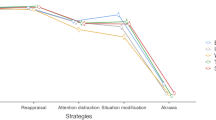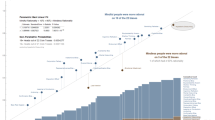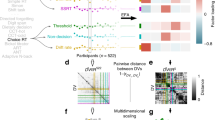Abstract
Two studies of self-modeling are described. Study 1 investigated whether self-modeling would inhibit cigarette smoking behavior. Fourteen cigarette smokers (four males and 10 females) served as subjects for a repeated-measures design. In the self-modeling condition, the subjects watched themselves on a television monitor while smoking; in the control condition, they watched a short cartoon film on the same monitor, also while smoking. The following were measured: (1) the amount of tobacco consumed, (2) the amount of time lit cigarettes were in contact with the subjects’ lips, and (3) the subjects’ physiological responses (GSRs). Study 2 investigated the role of cognitive factors in self-modeling. It followed much the same self-modeling procedures as Study 1. However, unlike Study 1, it incorporated a manipulated cognitive variable: attitudes toward cigarette smoking. Self-modeling reduced the amount of smoking relative to the control condition in Study 1. In Study 2 it was found that cognitive factors influenced the amount of smoking. Smoking increased in subjects supplied with information favorable to smoking, whereas it decreased in those supplied with information unfavorable to smoking. These findings and additional research on the efficacy of self-modeling relative to other procedures suggest the importance of cognitive factors in self-modeling.
Similar content being viewed by others
References
Cullinan, D., Kauffman, J.M., & LaFleur N.K. (1975). Modelling: Research with implications for special education.Journal of Special Education, 9, 209–221.
Davis, R.A. (1979). The impact of self-modeling on problem behaviors in school-age children.School Psychology Digest, 8, 128–132.
Hammond, E.C. (1962). The effects of smoking.Scientific American, 207, 39–51.
Howitt, D.L. (1982).Mass Media and Social Problems. Oxford: Pergamon.
Kauffman, J.M., Hallahan, D.P., & Ianna, S. (1977). Suppression of a retardate’s tongue protrusion by contingent imitation: A case study.Behaviour Research and Therapy, 15, 196–197.
Kauffman, J.M., LaFleur, N.K., Hallahan, D.P., & Chanes, C.M. (1975). Imitation as a consequence for children’s behavior: Two experimental case studies.Behaviour Therapy, 6, 535–542.
Kauffman, J.M., Snell, M.E., & Hallahan, D.P. (1976). Imitating children during imitation training: Two experimental paradigms.Education and Training of the Mentally Retarded, 11, 324–332.
Owusu-Bempah, J. (1983). Contingent imitation as an on-ward behaviour modification technique.British Journal of Mental Subnormality, 29, 92–96.
Owusu-Bempah, J., & Howitt, D.L. (1983). Self-modeling and weight control. British Journal of Medical Psychology, 56, 157–165.
Owusu-Bempah, J., and Howitt, D.L. (1984). The use of self-modeling in change.Indian Journal of Community Guardance Services, 1, 59–69.
Owusu-Bempah, J., & Howitt, D.L. (in press). The relative efficacy of self-modeling compared to negative modeling and biofeedback.British Journal of Cognitive Psychotherapy.
Thelen, M.H., Frautschi, N.M., Roberts, M.C., Kirkland, K.D., & Dollinger, S.J. (1981). Being imitated, conformity, and social influence: An integrative review.Journal of Research in Personality, 15, 403–426.
Wheman, P. (1976). Imitation as a facilitator of treatment for the mentally retarded.Rehabilitation Literature, 37, 41–48.
Author information
Authors and Affiliations
Rights and permissions
About this article
Cite this article
Owusu-Bempah, J., Howitt, D. The effects of self-modeling on cigarette smoking behavior. Current Psychology 4, 133–142 (1985). https://doi.org/10.1007/BF02686580
Accepted:
Published:
Issue Date:
DOI: https://doi.org/10.1007/BF02686580




